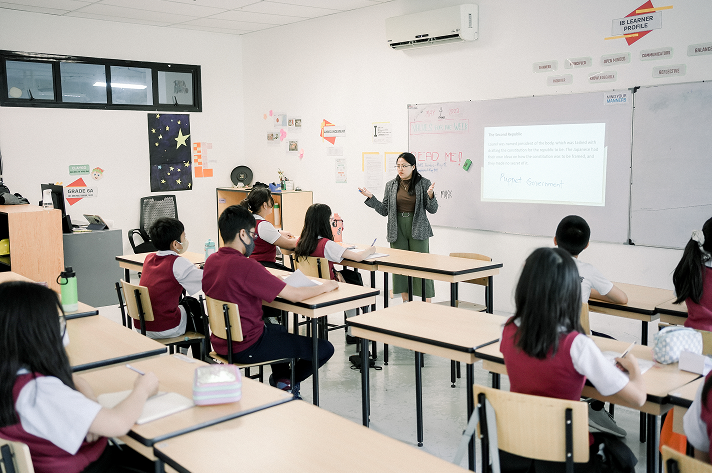
- February 5, 2025
- Admin
- 0
Top 5 Ways to Boost Academic Performance in Students
Every parent wishes to see their child shine in academics. Be it in the good elementary schools in Pasig or some international schools in Manila, teaching the correct habits can play a vital role in their academic journey. But what can their parents do to make sure the little ones achieve their full potential? It all comes down to choosing the appropriate learning techniques and creating a conducive atmosphere at home.
5 Ways to Boost Academic Performance in Students
Below, we’re going to cover five primary ways to aid the academic performance of students. Let’s get started.
1. Set Clear Learning Goals
The importance of setting clear and realistic learning goals cannot be overstated when seeking to improve academic performance. Setting goals gives children purpose, inspiration, and fulfilment. Parents must make sure that their kids set both short-term and long-term educational goals. If your child’s goal is something broad like ‘doing better in math,’ make it more specific – ‘finish math assignments on time and practice the multiplication tables for 10 minutes every day.’ Dividing big goals into smaller, bite-sized steps ensures children remain focused and can monitor their progress.
Give your child access to planners or goal-setting apps so that they can visualize their own goals. Seeing their progress increases their confidence and makes them want to achieve more. In addition, rewarding small wins on the journey develops positive learning behaviours.
2. Establish a Consistent Study Routine
When it comes to academic success, consistency is everything. Having a structured study routine also instils discipline and reduces distractions in children. You can then coordinate with your kids to set up a specific study schedule that caters to when your child does the best work. If your child focuses better in the evening, then set aside study time later in the day.
Also, keep the study area away from distractions like television, mobile phones, or unwanted noise. Having a proper workspace filled with sufficient light and good supplies allows you to focus better and work way faster. Also, you must add break time to the study routines. The Pomodoro Technique, which consists of 25-minute study sessions with intervals in between, can tell them when it’s time to take a break.
3. Promote Active Learning
Passive learning—where children simply read textbooks or listen to lectures—often leads to rote memorization without deep understanding. Instead, parents should encourage active learning strategies that promote critical thinking and problem-solving skills.
Techniques like summarizing lessons in their own words, teaching concepts to a sibling, or using flashcards for revision can make learning more interactive. Hands-on activities such as science experiments, math puzzles, and educational games further reinforce concepts in a fun and engaging manner.
Additionally, encourage children to ask questions, participate in discussions, and explore topics beyond their textbooks. This not only enhances their knowledge but also makes them more curious and interested in learning.
4. Support Children’s Homework
Homework is an essential part of academic growth, reinforcing classroom learning and building discipline. However, many children struggle with homework due to a lack of motivation or difficulty understanding the material. Parents can play an active role by creating a structured homework routine and providing necessary support.
Instead of simply giving answers, guide your child through the problem-solving process, helping them develop analytical skills. Encourage them to think critically, research independently, and break complex tasks into manageable steps. Additionally, ensuring that your child has access to the right resources—such as reference books, online educational tools, and tutoring services—can make homework less stressful and more productive.
If your child consistently struggles with a particular subject, consider seeking extra help from a tutor or an after-school program. Many international schools in Manila offer academic support services that cater to different learning needs.
5. Foster a Growth Mindset
A child’s mindset plays a crucial role in their academic performance. A growth mindset—the belief that intelligence and abilities can be developed through effort and perseverance—encourages children to embrace challenges and learn from mistakes. On the other hand, a fixed mindset, where children believe their abilities are unchangeable, can lead to a fear of failure and a lack of motivation.
Parents can nurture a growth mindset by praising effort rather than just outcomes. Instead of saying, “You’re so smart,” try saying, “I love how hard you worked on this.” Encourage children to see mistakes as learning opportunities and teach them that setbacks are a part of the learning process.
Additionally, share stories of successful individuals who faced failures but persevered. This instils resilience and determination, helping children develop a positive attitude toward learning.
Conclusion
Boosting academic performance requires a combination of structured learning strategies, supportive parental involvement, and a nurturing environment. By setting clear learning goals, establishing a consistent study routine, promoting active learning, supporting homework, and fostering a growth mindset, parents can empower their children to excel academically.
Whether your child is studying at elementary schools in Pasig or attending a prestigious international school, these practices will equip them with lifelong learning skills and the confidence to achieve their dreams. Start implementing these strategies today and watch your child thrive in their academic journey.

